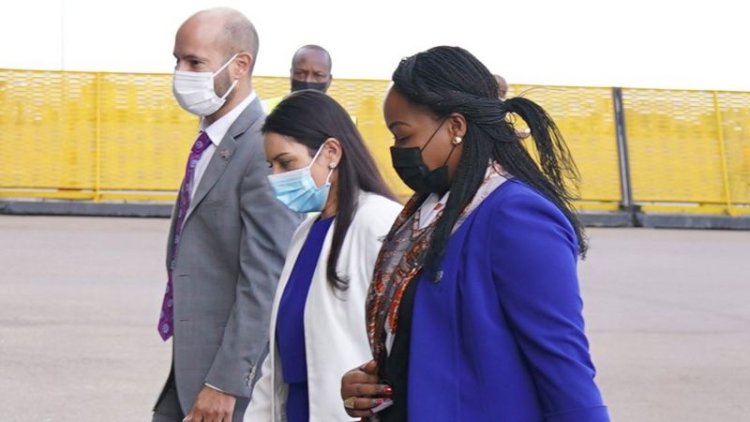The United Kingdom will provide asylum applicants with a one-way ticket to Rwanda.
Rwanda would accept responsibility for them under the idea, put them through an asylum process, and if they are successful, they would be given long-term housing in Rwanda.

According to new government plans, some asylum seekers who arrive in the UK on small boats crossing the Channel will be granted a one-way ticket to Rwanda.
Priti Patel, the Home Secretary, is in the African country to seal a deal for a £120 million trial involving largely single men who arrive in the UK via boat crossings.
Ministers face legal barriers and significant costs, according to BBC home editor Mark Easton, reporting from Rwanda.
The measures have been criticized as callous by refugee organizations, who have called for a reconsideration.
The concept was described as "unworkable, unethical, and extortionate" by Labour, while the Lib Dems warned it would be costly and useless.
The plan's exact parameters have yet to be finalized, but Mark Easton claimed the trial would be limited to largely single men who are believed to be inadmissible by British authorities.
Rwanda would accept responsibility for them under the idea, put them through an asylum process, and if they are successful, they would be given long-term housing in Rwanda.
Migrants will be entitled to "complete protection under Rwandan law, equal access to employment, and enrollment in healthcare and social care facilities," according to the Rwandan government.
The UK Home Office believes that existing asylum law will be sufficient to carry out the plan, but issues regarding the scheme's constitutionality persist.
Concerns have been expressed concerning Rwanda's human rights record.
Opponents have also said the annual cost of the full scheme would be far higher than the initial £120m payment and raised concerns about Rwanda's human rights record.
Wales Secretary Simon Hart said the plan was about ensuring the government can "more fairly distinguish between asylum seekers, refugees, and economic migrants".
Around three-quarters of people who apply for asylum in the UK are granted the status.
Mr. Hart said the full detail of the scheme will be released later on Thursday, but added the underlying motivation for the plan was breaking the business model of criminal gangs who put people in small boats to cross the Channel.
In a speech in Kent, Mr. Johnson will argue that action is needed to stop "vile people smugglers" turning the ocean into a "watery graveyard".
Last year, 28,526 people are known to have crossed in small boats, up from 8,404 in 2020.
Around 600 people made the crossing on Wednesday, and Mr. Johnson will say the figure could reach 1,000 a day within weeks.
"We cannot sustain a parallel illegal system," he will say. "Our compassion may be infinite, but our capacity to help people is not."
The Rwandan government and its president, Paul Kagame, have also been questioned over their human rights record.
A number of his detractors have been slain or targeted for assassination, but Rwanda has consistently denied any involvement on the part of the government.
Concerns have also been expressed concerning Paul Rusesabagina's conviction on terrorism charges, despite his participation in saving over 1,000 people during Rwanda's 1994 genocide, as depicted in the Hollywood film Hotel Rwanda.
The prime minister will also announce plans to hand operational control of the Channel to the navy, break the business model of people-smuggling gangs, and deter people from risking the crossing.
The measures are part of the government's long-term plan to "take back control of illegal immigration" after Brexit, Mr. Johnson will say.
While the number of people crossing the Channel in boats has increased, last year saw fewer people using other routes - such as by lorry - in part because of increased security at the Port of Calais.
Powers awaiting approval
The government's Nationality and Borders Bill includes a provision to create offshore immigration processing centers for asylum seekers.
The bill is making its way through Parliament, but with the parliamentary session expected to end within weeks, time is running out to pass it into law.
MPs are currently on a break, but when they return, they are due to review a series of amendments, including one about powers to offshore asylum claims.
The government has suffered a series of defeats in the House of Lords over the bill, which has come in for criticism and sparked protests.
Labour and the SNP have opposed offshoring asylum claims, and the UN's high commissioner for refugees said the practice "would be a breach of the UK's international obligations".
The plan to process asylum seekers abroad was first reported by the Times newspaper last year.
The newspaper said the Home Office had discussed the proposals with their counterparts in Denmark, which has passed legislation allowing it to relocate asylum seekers to countries outside Europe.
Criticism
Human rights activists have criticized the scheme's harmful impact on refugee rights, as well as its expense, and have questioned if it would fulfill its goals.
The idea, according to Enver Solomon, chief executive of the Refugee Council, will not address the reasons why desperate people flee to the UK.
The plan, according to Amnesty International UK, is a "shockingly ill-conceived idea" that will cause more misery and waste "vast amounts" of public funds.
"We all want to see an end to unlawful crossings," said Shadow Culture Secretary Lucy Powell, although Labour supports "boring tactics" like curbs on people traffickers.
"Thousands of families are opening their homes to migrants, but this Conservative administration is closing the door in their faces," said Alistair Carmichael, the Liberal Democrats' home affairs spokesperson.
The concept of sending "vulnerable people" to Rwanda is "extremely terrifying," according to Ian Blackford, the SNP Westminster leader.

 Boakyewaa Lawrencia
Boakyewaa Lawrencia 



































